Squash Beyond Borders:
Urban Ambassadors Bring Racket Diplomacy
From Harlem to the Holy Land
This story, written by A.J. Kohlhepp, recounts the 2018 summer journey of Jazmin ’12 and Mawa ’14 to squash programs in the Middle East. Read on to learn of how the trip came to be, their adventures, and their impressive work as ambassadors of StreetSquash.
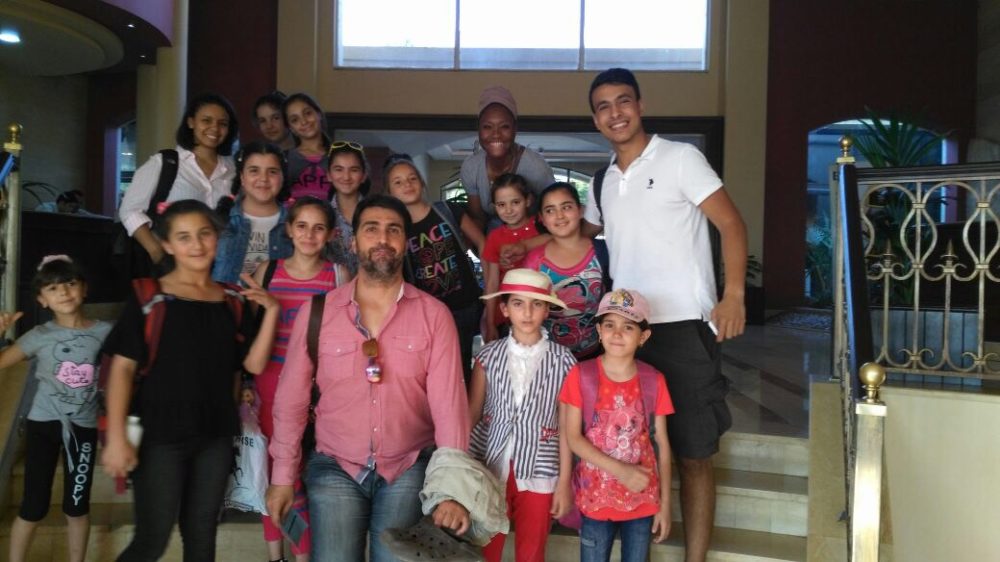
Jazmin ’12 (top row, far left) and Mawa ’14 (top row, second from right) prepare for a trip to the Dead Sea in Jordan with young athletes from the Squash Dreamers program.
When Mawa Ballo, a freshly minted graduate of Connecticut College and an alum of StreetSquash in Harlem, heard about the chance to coach squash & teach English to Syrian refugees in Jordan and at-risk Jewish and Arab children in Israel, she jumped at the opportunity. Ballo had traveled abroad before–two of her six siblings still live in her native Cote D’Ivoire, and she had participated in other global exchanges as a high school and college student. But squash diplomacy in the Middle East? This was an adventure she couldn’t pass up.
American Foundations, International Developments
“Urban squash” was an idea that emerged in the mid-1990s along traditional corridors of power and privilege in the northeastern United States. Greg Zaff, who had played and coached at Williams College and was working on a master’s thesis at Harvard’s Kennedy School of Government, posed an audacious question: could the sport of squash, generally perceived as a rarified pastime for the American elite, serve as a means to provide access and opportunity for inner-city youth?
Nearly a quarter of a century later, the answer is a resounding “yes.” More than eight hundred urban squashers have completed high school thus far, participating in programs that provide academic enrichment, college support and career readiness in addition to squash coaching. Among program graduates, an impressive 77% have gone on to pursue four-year degrees, roughly three times the rate of peers in the same demographic. With more than two thousand additional students currently participating, urban squash is thriving in the United States.
The Squash and Education Alliance now counts nineteen American organizations within its ranks, from traditional hotbeds like New York and Philadelphia to brand-new squash zones in Houston and Detroit, stretching all the way from Portland, Maine to San Diego, California. But that trend is not confined within American borders as SEA now counts international members in five countries and developing programs in several others.
Summer 2018 witnessed a uniquely international experience in the annals of urban squash: a mission by two StreetSquash alums to volunteer at Jordan’s Squash Dreamers and Israel’s SquashBond. Their adventure constitutes a remarkable development in a compelling story: the adoption and adaptation of the urban squash concept in lands far from its conception.
From a Dream to a Scheme to an Odyssey
The journey emerged out of a fortuitous meeting in the depths of New York winter. SquashBond’s executive director Nitzan Moree visited StreetSquash headquarters in January 2018 to strengthen connections between their programs. StreetSquash’s Founder and Executive Director, George Polsky, was aware of the up-and-coming Israeli program and eager to contribute to that group’s ongoing efforts to achieve membership in the Squash & Education Alliance.
For Polsky, the July trip to Israel represented the possibility for an interesting kind of closure. “The whole idea of StreetSquash emerged at the 1997 Maccabiah Games,” he recalls, noting that his coach at that event was none other than Greg Zaff, founder of the original U.S. urban squash program. “I was inspired to think that StreetSquash personnel might contribute to this work in Israel.”
The idea that emerged: to take the first step of a prospective exchange by sending two of their own to volunteer with Moree and his team in Ra’anana, Israel, where they serve up squash, mentoring and English to an even mix of at-risk Jewish and Arab children. Sara Bamberger, board member for SquashBond, offered one more suggestion: why not combine their visit to Israel with a session at Squash Dreamers, working with Middle Eastern refugees in Amman, Jordan?
In the meeting, Polsky guaranteed a willingness to contribute “anything we can do to make this happen.” Much of that work fell to StreetSquash’s Assumpta Galang, Director of College Success and Alumni Support, who oversaw planning on the American side as part of her job in supporting alums beyond college.
Besides help with logistics, StreetSquash was instrumental in terms of funding, covering airfare for the emissaries. They also provided a modest stipend for their ambassadors, who would have to pass up more lucrative summer opportunities to make the trip. The fact of the trip brought with it another challenging question: who would go?
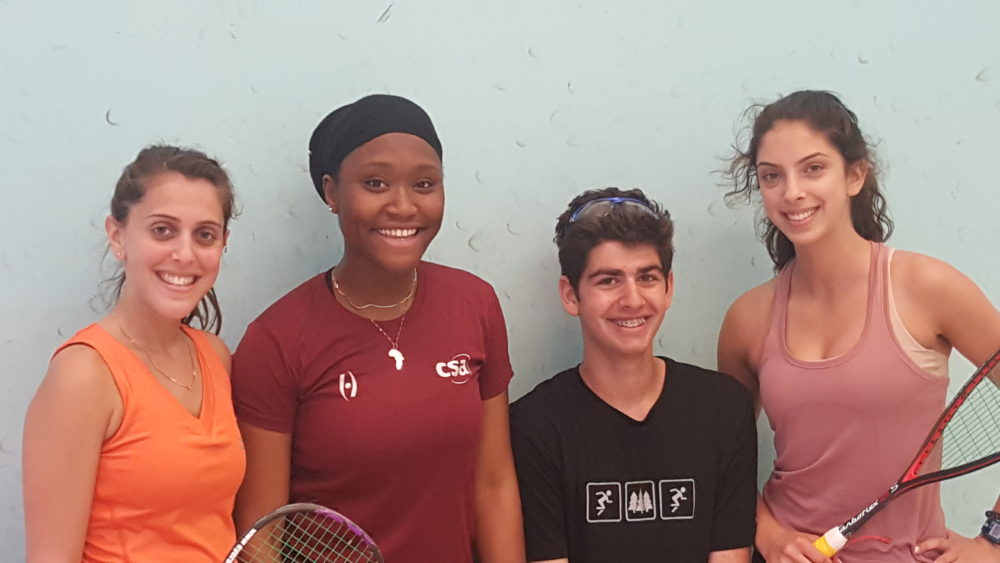
Mawa (second from left) has made many new friends on a squash court in her lifetime. Seen here in between sessions with other volunteers and nationally-ranked players at SquashBond’s program in Ra’anana, Israel.
Amazing Ambassadors
As StreetSquash administrators considered the possibilities, the names of two alums rose to the forefront. Jazmin Matos, who had been working to run the national tournaments for SEA after graduating from Franklin & Marshall, and Mawa Ballo, who was about to graduate from Connecticut College. For Ballo and Matos, this was a no brainer. “How could we pass that up,” laughs Ballo when asked.
For their part, Ballo and Matos were ideal candidates. “Those two are such amazing ambassadors,” says Jack Smith, one of the Squash Directors at StreetSquash. “They live and breathe the gospel according to SEA – always showing up for events, always mentoring up-and-coming squashers.” The fact that both have extensive travel experience was a valuable add-on. (Matos’ resilience would be sorely tested in the midst of the trip, as she was held up for several days in Jordan due to a miscommunication regarding the purpose of her visit.)
Although their Israeli visit was the first aspect of the trip to be formalized, the women actually began in Jordan. Their first experience on the ground was an obligatory pilgrimage to Petra and the Dead Sea, which turned out to be quite impactful as several of the Squash Dreamers girls had never even been swimming before. Once they were settled in Amman, Ballo and Matos logged some serious hours with Syrian, Sudanese and Palestinian refugees, hitting lots of squash balls, quizzing the girls on English expressions and generally just soaking things in.
A Test Run for Future Exchanges
“We were excited to have Mawa and Jazmin visit,” reports Squash Dreamers co-founder Clayton Keir. “This was kind of a test run for future exchanges, and we are thrilled with how well things worked out in Amman.”
From George Polsky’s perspective, ventures like this one provide, “a chance to connect cultures and kids across the world.” If the venture should move in a reciprocal direction, with Middle Eastern kids traveling to New York City, all the better in terms of breaking barriers and creating bonds. Better still if these individual efforts morph into some kind of regular exchange in the years to come. Polsky notes that StreetSquash has already developed a relationship with Squash Urbano Colombia and, as such, has seen participants in both programs benefit from “a local passion that generates new growth and development.”
For his part, SEA executive director Tim Wyant is also bullish about the prospects for these kinds of initiatives. Having just welcomed SquashBond into the SEA umbrella, Wyant is uncertain about which international locale will see the next urban squash initiative emerge. Nor can he be sure whether any individual program will be able to satisfy SEA’s requirements, as the membership criteria aren’t always easily translatable to foreign contexts. But Wyant knows that one essential truth adheres in every locale: that program success is always dependent upon the passion and commitment of the people involved.
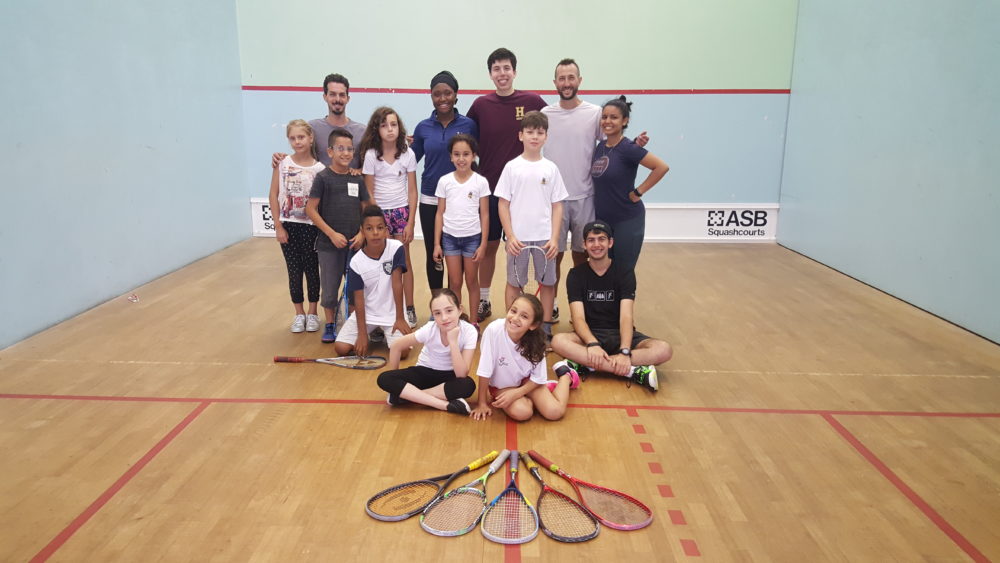
Students and staff of Israel’s SquashBond after a session with Mawa and Jazmin.
Feeding Balls and Finding Faith
Passion and commitment were not in short supply in Israel. Ballo, who arrived first in Ra’anana as Matos worked through visa issues, was joined by Sam Turner, Benjamin Dahan and Dannielle Benstock. These Pennsylvania-based teens had already developed relationships with SquashBond staffers. “It was a bit tricky to have so many amazing coaches on hand,” laughs Moree. “But that is a very good problem to be faced with.”
As in Jordan, their Israeli trip had squash as the centerpiece but featured many important auxiliary aspects. Ballo enjoyed a Shabbat Dinner, her first ever, at the home of Sara Bamberger. Bamberger recalls the dinner fondly as one more element of the “great bonding of diverse backgrounds and experiences.”
For Ballo in particular, the trip was transformative in ways that she never anticipated. The first breakthrough came early on as she was struggling to re-set her internal clock to Jordanian time. “I was still awake at 4:00 a.m.,” she recalls. “All of a sudden, I heard this amazing sound coming from the mosque down the block [in Amman].” It turned out that the call to prayer was the last thing she heard at the end of a very long day and the beginning of an important awakening in terms of her own perspective.
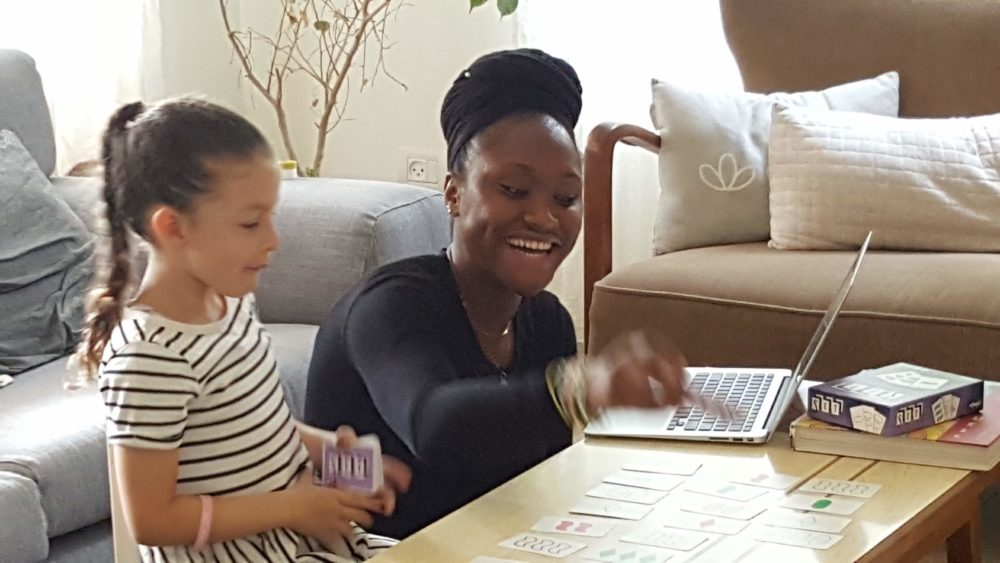
Before her first Shabbat dinner, Mawa helps a student brush up on English language skill building.
Her faith proved relevant in other scenarios as well, Ballo reflects. She began to wear her hijab more often on the trip, a practice that she had seldom followed in growing up in Harlem or attending college in Connecticut. This simple act, in turn, made her into a sort of role model for the young Muslim women at both programs, who had had limited exposure to adult female athletes in their home environments. “I think I showed them a kind of potential that they had only heard about, but seldom seen, in their own lives.”
Ballo also underwent a kind of re-education of her own on the trip. “For me and my sister growing up,” she reveals, “we weren’t rich by any means, but all the basics were in place: shelter and food and educational opportunity and even a chance to play squash.” No such certainties were in place for many of the kids she was working with in Jordan and Israel, who had faced such extreme conditions in their formative years.
For the Squash Dreamers, most of whom are refugees from other Middle Eastern nations, the simple fact of consistent housing and food in Amman constitutes a radical change from their early childhood. The ability to pick up a sport is something that those girls wouldn’t have been able to conceive of.
For the participants in SquashBond, the court becomes a means to find common purpose and strive toward mutual goals. (Nitzan Moree was thrilled that home teams at the most recent Maccabia Games included Israelis of Arab and Jewish descent.)
Things to Come
The differing missions for Squash Dreamers and SquashBond emerged out of particular communities and contingencies. Given that fact, there can’t be a single comprehensive template for what urban squash looks like. Tim Wyant agrees that it would be untenable for SEA to expect any kind of cookie-cutter methodology on the part of member programs.
Squash Dreamers, for their part, seeks to provide athletic opportunity for their girls and, by extension, to open up travel opportunities in the region and the wider world. Better still if this hard work on court provides access to international boarding schools or universities, or maybe even professional squash opportunities in decades to come. This commitment to international competition came to remarkable fruition this summer as Squash Dreamers managed to send four participants and a coach to east Asia to compete in the Hong Kong Open.
SquashBond, meanwhile, wants to change the nature of the adolescent experience for their kids. “Most Israelis,” observes co-founder Moree, “go their entire childhood without interacting with a member of other ethnic groups. We put them all on court together on day one.” And for the kids in Squash Bond, their participation breaks through long-held barriers within that divided society as the program administrators make sure to bring together a mixed group of Jewish and Arab children.
At the micro- level, reports Ballo, things are pretty simple and surprisingly universal. Here is what she heard, again and and again: “Mawa, will you hit with me? Which coach is the best? Can we play points?” These simple sentences demonstrate the children’s increasing confidence with English and their passion for the sport they share.
Every kid everywhere desires the attention of the adults with whom they share that passion, wants to know which coach would beat the other coaches, and prefers to play the sport rather than spend endless hours on drills. Those truisms hold up on the squash court regardless of external climate or conflict.
It is probably unrealistic to think that the sport of squash can have a significant impact on the refugee crisis in the Middle East or the rancorous state of affairs within Israel. But is it too absurd to hope that the bonds that grow out of these encounters, whether on-court or off, can open up the way toward dreams of a peaceful, prosperous future? And is it crazy to think that urban squash, which has made small but important gains in terms of the opportunities for American youth, can play a role in that better, brighter world?
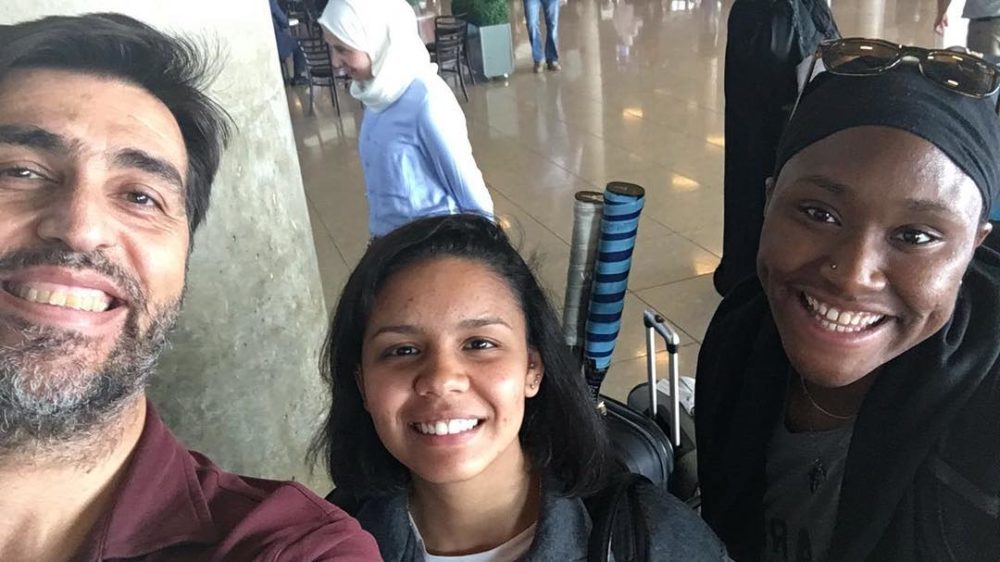
Jazmin’12 (center) and Mawa ’14 with their host in Jordan. Both young women agreed that their trip was transformative.
Mawa Ballo, for her part, thinks it just might happen. Squash might just change the country, and the world, one kid at a time. Digging in to her new roles as elementary teacher and coach at Fessenden School in Boston, Ballo has hardly had time to process everything that she experienced along this summer. Asked if she would take on another trip of this sort in summers to come, Ballo flashes a quick smile.
“Sign me up,” she laughs, heading out the door for a quick on-court session with fellow Fessenden coach Randy Coplin, who just happens to be a Connecticut College graduate and urban squash alum (SquashBusters). The squash world, which can sometimes seem almost as large as the globe itself, can also get small in a hurry.

Recent Comments